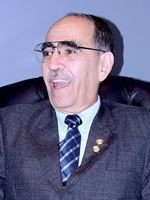AS/COA Online | LatAm in Focus: The Strange Case of El Salvador's Plummeting Homicide Rate
/In the year since Nayib Bukele's June 2019 presidential inauguration, El Salvador's murder rate plunged, dropping by roughly 60 percent. That’s a major feat in a country that just five years ago had the highest homicide rate in the world. The precipitous drop in violence is one of the main factors fueling remarkably high approval ratings for Bukele, Latin America’s youngest head of state—a 39-year-old who campaigned as a Twitter-savvy outsider and ended the two-party grip on power dominating Salvadoran politics since the end of the country’s civil war.
Then, at the end of April 2020, murders once again spiraled out of control. With 85 homicides over the course of just five days, the government’s ability to keep the peace seemed vulnerable once again to the power plays of El Salvador’s gangs. The president acted swiftly, enforcing 24-hour lockdowns in prisons and welding metal sheets onto cell doors to prevent incarcerated gang members from communicating. Bukele also drew international attention and condemnation for tweeting photos of large numbers of imprisoned gang members locked together in human chains in the middle of the COVID-19 pandemic.
“It’s still a very fragile and very easily reversible equilibrium.”
This kind of mano dura response to gangs predates the current government. “Before Bukele took the presidency…homicide levels were already on a downward trend, which was mainly due to basically all-out war that was waged by the state security forces against gangs, combined with very tough measures in prisons that hindered the communications between gangs in jails and outside jails,” Tiziano Breda, Central America analyst with the International Crisis Group (ICG), tells AS/COA Online’s Carin Zissis.
Still, the rate has dropped to record lows under Bukele, with the government crediting its security strategy, known as the Territorial Control Plan. Breda expressed doubts, saying: “Most of the measures that have been taken resemble the attempts from previous administrations, which didn’t provide these stark and immediate results.”
So how did Bukele do it? In a July 2020 report titled Miracle or Mirage? Gangs and Plunging Gang Violence, the ICG suggests there are other reasons behind plummeting crime. “We think it’s more likely to be the gangs’ decision to scale back the use of violence…probably as part of an informal understanding between gangs and authorities,” says Breda. This wouldn’t be the first time a Salvadoran government negotiated a gang truce. The 2015 surge in violence took place after the last truce fell apart.But there are reasons why this time around provides a new opportunity, says Breda, who notes that Bukele’s popularity means he has a great deal of political capital to engage in dialogue with the gangs. To some degree there’s little choice; gangs are active in 90 percent of El Salvador and involve some 400,000 people in a country with a population of 6.5 million. Interacting with gangs is “unavoidable” on a local level even when entering or exiting communities, says Breda, who adds that how Bukele decides to wield his influence has much to do with him having an eye on next year’s legislative elections.
Available on Apple Podcasts, Google Podcasts, Soundcloud, Spotify, and Stitcher.
Luisa Leme produced this episode.

 Appointed last month as the new Salvadoran ambassador in Washington, Rubén Zamora spoke with AS/COA Online’s Carin Zissis about the evolution of U.S.-Central American security policy in light of President Barack Obama’s recent trip to the region, saying: “Now the Obama administration is moving towards a more comprehensive approach, using the mantra, I would say, of partnership.” The ambassador also gave an overview of the Salvadoran government’s local strategies to drive down crime, as well as how to leverage initiatives such as the Partnership for Growth and CAFTA-DR. With a political career dating back to 1970, Zamora served twice as a legislative deputy in El Salvador’s National Assembly, was a member of the country’s Peace Commission, and ran, in 1994, as the first presidential candidate of the left’s coalition after the 1992 Peace Accords. More recently, he held the post of ambassador to India.
Appointed last month as the new Salvadoran ambassador in Washington, Rubén Zamora spoke with AS/COA Online’s Carin Zissis about the evolution of U.S.-Central American security policy in light of President Barack Obama’s recent trip to the region, saying: “Now the Obama administration is moving towards a more comprehensive approach, using the mantra, I would say, of partnership.” The ambassador also gave an overview of the Salvadoran government’s local strategies to drive down crime, as well as how to leverage initiatives such as the Partnership for Growth and CAFTA-DR. With a political career dating back to 1970, Zamora served twice as a legislative deputy in El Salvador’s National Assembly, was a member of the country’s Peace Commission, and ran, in 1994, as the first presidential candidate of the left’s coalition after the 1992 Peace Accords. More recently, he held the post of ambassador to India.